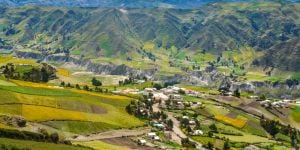español for Gringos
Subscribe to the topic
Post new topic
And don't forget these birds:
Gallina is hen.
Golondrina is swallow.
Gorrión is sparrow.
Garza is heron.
Grulla is crane.
What's the difference?
What's the difference between respuesta, repuesto y expuesto.
respuesta is an answer or response.
repuesto means spare part or replacement part.
expuesto means exposed.
It's from exponer, a verb meaning to expose (or to explain). Another common word for 'explain' is explicar.
What's the difference?
What's the difference between guita, guitarra y El Guasón?
.
.
.
.
guita = cord or twine
guitarra means guitar (musical instrument)
El Guasón is The Joker.
An even easier method for accents, ¡¿, Etc: Spanish accents caps lock (http://www.onehourprogramming.com/spanish-accents/)
Another way to get accented characters is to use the Windows built-in capabilities.
You just choose a Spanish keyboard. You can still type in the English language without any problems, but you have easy intuitive access to all Spanish accented characters.
Once you choose a Spanish keyboard, to get á you just type ' then a. It's the same for all the other accented vowels. á é í ó ú
To get the umlaut ü type " then u.
For the ñ type the ~ then the n.
For capitals just type the accent or tilde first then the capital letter: Á É Í Ó Ú Ü Ñ
For the ¿ hold down the right Alt key then press the ? key.
For the ¡ hold down the right Alt key then press the ! key.
Choosing a Spanish keyboard is easy:
Go to Control Panel / Region and Language
Press the Keyboards and Languages tab
Click on the Keyboards and Languages button
Press the Add button to add a Spanish language keyboard - I use Spanish (Colombia),
and check the United States-International box for the keyboard
Click OK
Now under the General tab at the top choose your default input language - I chose
Spanish (Colombia) - United States-International
Press the Apply button
That's it!
What's the difference?
What's the difference between burro, burrito y barra?
.
.
.
burro = small donkey
burrito is a food -- a wrap often containing meat, rice and beans.
barra is a bar or stick.
What's the difference?
What's the difference between postre, postal y posterior?
.
.
.
.
postre is dessert. The word is masculine .. el postre.[i]
postal = of or pertaining to the post office.
posterior = the rear .. or rear part.[i]
Adapted from wordreference.com:
El motor de un escarabajo está en la parte posterior del coche.
The motor of a Beetle is in the rear of the car.
Other words for car include carro, auto y automóvil.
What's the difference?
This episode of What's the Difference is dedicated to expat.com member Lebowski888. Thank you for supporting this feature.
What's the difference between higo, hongo y hondo?
.
.
.
.
higos are figs.
hongos are mushrooms.
hondo is an adjective meaning deep. Another word for deep is profundo, which can also mean profound.
cccmedia wrote:hongos are mushrooms.
This may vary regionally - in Colombia I have found that hongo (and also seta) is used generally to refer to any wild fungus (which may or may not be edible), but when they speak of an edible mushroom, they generally use the word champiñón.
If in doubt you can always ask ¿Se puede comer? or ¿Es comestible? If it's for sale in a market it should be safe - in the wild (just as in any country anywhere) you may be literally betting your life that the person you ask is an "expert"...in the wild I usually stick to just Morchella esculenta, an edible morel, which when cooked (sauteed in butter) is delicious, and easy and unmistakable to recognize...
What's the difference?
What's the difference between cerca, acercarse y cerciorarse?
.
.
.
.
cerca means close or nearby.
acercarse means 'to approach'.
No me acerques. Do not approach me.
cerciorarse means to check, verify or make sure.
Spanish-language synonym: averiguar.
What's the difference?
What's the difference between oliva, olivo y olivar?
.
.
.
.
oliva is an olive.
olivo is an olive tree.
olivar is an olive grove.
En el olivar, puedes oír el canto de pájaros.
In the olive grove, you can hear the singing of birds.
Another common word for olive is aceituna.
Aceituno is olive tree.
What's the difference?
What's the difference between dudoso, baboso y mentiroso?
.
.
.
.
dudoso means doubtful.
baboso means slimy.
Estaba jugando con un caracol baboso. He was playing with a slimy snail.
baboso can also mean lovestruck. Describing a woman, it's babosa.
mentiroso: lying (adjective) or liar (noun).
What's the difference?
What's the difference between paz, pez and pesar?
.
.
.
.
paz is peace. 'The peace' is la paz, like the main city in Bolivia.
pez means fish. El pez = the fish. Los peces is the plural form.
Pesar is the verb 'to weigh'.
Pesa el pez, por favor. Weigh the fish, please.
A bit more on the uses of pesar.
One of my favorite dichos in Spanish:
El que no carga la enjalma, le parece que no pesa. For the one not carrying the saddlebag, it seems to weigh nothing.
Note the colloquial uses of pesar, too. In Colombia, que pesar is another way of saying que lástima or que pena.
¡Que pesar que no vinieron para la fiesta! What a shame they didn't come for the party!
A pesar de nuestro empeño, fracasamos. In spite of our determination, we failed.
Pese a las variaciones de un año a otro, la superficie cultivada no varió notoriamente entre 2002 y 2007. Notwithstanding year-to-year variations, the cultivated area did not vary significantly between 2002 and 2007.
Pese a nuestros escasos recursos financieros y de otro tipo, hemos logrado grandes éxitos en esta esfera. Despite our limited financial and other resources, we have achieved great successes in this area.
What's the difference? -- Daily Double Edition
1. What's the difference between cadera y cadena?
.
.
.
.
cadera = hip (part of the body).
cadena = chain -- as in chain of stores. Also, a (gold, metal or beaded) chain for the neck.
2. What's the difference between bandera y bandeja?
.
.
.
.
bandera = flag
bandeja = tray
bandeja paisa is a platter of largely starchy Colombian foods that is the signature dish of the paisas of Antioquia, a department or state in Colombia where Medellín is the main city.
What's the difference?
What's the difference between cabello, caballo y caballero?
.
.
.
.
cabello is hair (on the head).
caballo is a horse.
caballero is a gentleman. Also: a knight .. or a horseman.
cola de caballo is a ponytail.
What's the difference?
What's the difference between lugar, hogar y cigarro?
.
.
.
.
el lugar means 'the place'.
hogar means home. As usual, the 'h' is silent.
cigarro means cigar. Another common word for cigar is puro.
What a Gringo thinks.
colocar
What a Gringo thinks it means: the car in a locomotive train that carries the Coca Cola and Pepsi.
What it really means: to put, place or arrange.
Coloquemos esta alfombra en la sala.
Let's lay this carpet in the living room.
Coloqué las fichas de casino en la mesa de veintiuna porque quería cambio.
I placed the casino chips on the blackjack table because I wanted change.
fastidiar
What a Gringo thinks it means... to be neat or fastidious.
What it really means... to annoy.
El vagabundo todavía estaba fastidiándome aunque ya dije no a su rogar.
The vagrant was still annoying me even though I already said no to his begging.
realizar
What a Gringo thinks it means... to realize.
What it really means... to make .. or to carry out (a task).
El sábado realizé tres tareas sencillas y entonces recibí cinco dólares de nuestro vecino.
I carried out three simple tasks on Saturday and then received five dollars from our neighbor.
A common idiomatic phrase meaning "to realize" is darse cuenta.
Me dí cuenta que Margarita no iba a volver.
I realized that Margarita wasn't going to come back.
What's the difference?
What's the difference between rozar, rezar and rogar?
.
.
.
.
rozar means to graze or brush against.
rezar is 'to pray'.
rogar is 'to beg'. In a religious context it can mean 'to pray'.
What's the difference?
What's the difference between muela, muelle y marear?
.
.
.
.
muela is a molar or back tooth.
muelle means pier, dock or wharf.
(MWEL-yay)
marear is a verb meaning: to make dizzy, queasy or sick.
La montaña rusa me mareó.
The roller coaster made me feel queasy.
What's the difference?
What's the difference between cola, colocar y colador?
.
.
.
.
cola means tail .. or a line (as in waiting in line).
Hemos estado esperando en esta cola del banco por treinta minutos.
We've been waiting in this bank line for 30 minutes.
cola de caballo = ponytail
colocar is to put, place or organize.
Coloque estas fichas, crupier, para proveerme un total de cuatro apuestas.
Arrange these chips, dealer, to give me a total of four bets.
colador is a strainer or colander (a kitchen device used to remove water).
Usando este colador, es possible a quitar toda agua de nuestra olla de espagueti.
Using this strainer, it is possible to remove all water from our pot of spaghetti.
Show me the money.
Top ten words, signs and nicknames for money in Ecuador and Colombia...
10. dinero .. money.
9. plata .. money. Literal meaning: silver.
8. dólares .. units of USA money, the currency of Ecuador, also known well by currency exchanges and businesses in Colombia. Singular: dólar.
7. Gringo rubbing a thumb against middle three fingers: signaling it's about money.
6. peso .. Colombian unit of currency.
5. lucas .. units of 1,000 Colombian pesos (1,000 COP). Lately (2018), the exchange rate has been about 3,000 COP to the USA dollar. Ipso facto, one dollar equals about three lucas.
4. efectivo .. cash.
3. particular (pahr-tik-oo-LAHR) .. cash.
Term is often heard at healthcare facilities in Colombia. If an Expat goes to reception, the first question they may ask is ¿Seguros o particular? It means .. are you covered by insurance or will you be paying us in cash?
2. Monedas .. coins.
And the number-one term for money in this region .. in this case, if one is robbing a bank...
1. ¡Suelta la pasta! This is how a bank robber rudely demands "the dough." From the root verb 'soltar', to free or let loose. (This item from Wiki How.)
The 'a' factor.
When a Spanish-language sentence contains a subject (the doer) and an object (the party done to), the single-letter word 'a' is employed if the object is a person. This avoids confusion as explained below.
Examples....
El ladrón golpeó a Humberth porque no tuvo efectivo en sus bosillos.
The thief hit Humberth because he didn't have any money in his pockets.
Ponga el libro en el mostrador.
Put the book on the counter.
(No 'a' is needed because the subject, the book, is not human.)
Atacaron a nuestros soldados los cavernícolas.
The cavemen attacked our soldiers. 'Cavernícolas' is the subject here.
If this last example, if the 'a' was incorrectly left out, it might falsely appear that 'nuestros soldados' attacked the cavemen.
However, if that actually was the case and the soldiers were attacking, the sentence would contain 'a' in a different word order....
Atacaron nuestros soldados a los cavernícolas.
Our soldiers attacked the cavemen.
Here, the 'soldados' are the subject, not the object.
Also note that in español, the subject coming after an action verb or at the end of a sentence is a common language construction.
What's the difference?
What's the difference between yema, yeso y yerno?
.
.
.
.
yema means yolk (of an egg).
yeso is plaster or gypsum.
yerno is son-in-law.
yerna is daughter-in-law.
What's the difference?
What's the difference between corazón, dedo corazón and corazonada.
.
.
.
.
el corazón means 'the heart' (internal anatomy).
el dedo corazón is the middle finger.
corazonada is a 'hunch'.
What's the difference?
What's the difference between the frequently-used verbs sentirse and sentarse?
sentirse can mean 'to feel' as in how one feels ..
or it can mean 'to be sorry'.
sentarse means 'to sit' or 'to sit down'.
----
Me siento dolor, Sr. Dentista.
I feel pain, Mr. Dentist.
Lo siento.
Sorry (about that).
Prefiero a sentarme en la primera fila.
I prefer to sit in the front row.
----
There are other meanings for these commonly-used verbs.
Consult wordreference.com for more definitions.
Al dentista. At the dentist.
In South America, a dental office is one place where you want to understand what is going on.
Many dentists do not speak much English.
Here's a top-ten list of words or phrases that may be helpful....
10. odontología dentistry
9. los dientes the teeth
8. las muelas the molars
7. la boca the mouth
6. Duele mucho. it hurts a lot.
DWELL-ay
5. Sólo duele un poco. It just hurts a little.
4. Estaba sangre. There was blood.
3. hilo dental dental floss
2. Espejo, por favor. Mirror, please.
ess-PEH-ho
And the number one sentence on this dental list....
1. Doctor, hay demasiado metal en mis dientes. ¿Cuánto cuesta para quitar todo y reemplazar las coronas?
Doctor, there is too much metal in my teeth. How much does it cost to remove all of it and replace the crowns?
Molar (plural molares) is also used for molar. Note the closeness to the verb moler, to grind - thus also the noun molino, mill, and the adjective molido/a, ground, as in carne molida, ground beef.
Also don't forget colmillo, which can mean depending on context:
canine tooth
eye tooth
fang
tusk
And the equivalent to our saying in English "Don't look a gift horse in the mouth":
A caballo regalado no se le mira el colmillo, also
A caballo regalado, no le mires el diente
Here are some near sound-alikes (not quite homonyms) that sometimes confuse me. I guess these may have been posted before by CCCMedia or OsageArcher. Please correct my translations if I'm a bit inaccurate.
¿Estás cansado? Are you tired?
¿Estás casado? Are you married?
el hombro. The shoulder
el hombre. The man.
El hambre. The hunger.
comparar. to compare
comprar. to buy
pedir. to ask for
perder. to lose
odio. I hate
el oído. the hearing
lebowski888 wrote:Here are some near sound-alikes that sometimes confuse me. I guess these may have been posted before by CCCMedia or OsageArcher. Please correct my translations if I'm a bit inaccurate.
¿Estás cansado? Are you tired?
¿Estás casado? [b] Are you married?
[b]el hombro. the shoulder
el hombre. the man
el hambre. the hunger
comparar. to compare
comprar. to buy
pedir. to ask for
perder. to lose
odio. I hate.
el oído. the hearing
¡Bravo!
---
Notes and clarifications...
Possibly due to technical issues, the bold and italics functions in the above Lebowski citation in this post are a bit off. C'est la vie.
According to opinions expressed at wordreference.com, either common verb for 'to be' -- ser or estar -- is correct when paired with casado/cansada (married).
Ella era casada dos veces y divorciada dos veces.
She was married two times and divorced two times.
(Also correct) Ella estaba casada dos veces y divorciada dos veces.
Like the feminine word agua (water), the feminine word for hunger, hambre (AHM-bray), is preceded by the article 'el' when an article is used. The corresponding adjectives that end in 'a' (not 'o') are used.
(wordreference.com)
El agua está cálida.
The water is warm.
El hambre en este país me parece asombrosa.
The hunger in this country seems amazing to me.
el oído means 'the hearing' (also can mean the inner ear), as Lebowski indicated. It means 'the hearing' as in using your ears as opposed to a legal or congressional hearing, for instance, which hearing can be translated as la audiencia.
Perhaps Brother Archer can explain why it's el agua and el hambre,
but la audiencia.
cccmedia wrote:Perhaps Brother Archer can explain why it's el agua and el hambre,
but la audiencia.
Nope.
Except, it's the sound - you don't say la agua or la hambre because the a sound would be repeated (a is pronounced like the "a" in yacht).
But for la audiencia, the au is pronounced like "ow" (owl, out) so there is no repetition.
There is also the concept of "strong" and "weak" vowels in Spanish which is good to know (Summary:
The strong vowels of Spanish are a, e, and o; the weak vowels are i and u. When two strong vowels are next to each other, they form separate syllables; in other combinations, the vowels are in the same syllable):
https://www.thoughtco.com/strong-vowels … ls-3080300
...but just practice and listening to native speakers will soon make clear to you how to pronounce and what article to use for words like hambre and agua, and also why you say, for instance:
español e inglés and not español y inglés (but inglés y español is OK), and
de una manera u otra (one way or the other) and not de una manera o otra.
Earlier this past week, with the assistance of a native speaker, I cleaned up my pronunciation of maestra/maestro.
mah-ESS-troh
The word has three syllables, unlike the Jerry Seinfeld/Elaine Benes pronunciation with two syllables.
cccmedia
What's the difference?
What's the difference between the nouns dolor, dólar y dolo?
dolor is pain as in muscle pain.
No me siento dolor en esta mano.
I don't feel pain in this hand.
dólar is a dollar, such as a USA dollar or Canadian dollar.
The plural is dólares, with an accent mark needed.
dolo is fraud, as in tax fraud.
What's the difference?
What's the difference between bigote, grandote y sacerdote?
grandote means huge or enormous. Like most Spanish adjectives, it can easily be converted to a noun.
Ese grandote es el campeón de los pesos pesados.
That huge man is the heavyweight champion.
bigote is a moustache.
sacerdote is a priest.
These last two words are masculine:
el bigote .. el sacerdote (sah-sehr-DOH-tay).
What's the difference?
What's the difference between prender, aprender y sorprender?
prender means 'to turn on' or 'to power on'.
Prende la luz, por favor.
Turn on the light, please.
The word can also mean 'to ignite' or 'to affix'. See wordreference.com for the full story.
aprender means ' to learn'.
sorprender means 'to surprise'.
cccmedia wrote:prender means 'to turn on' or 'to power on'.
Prende la luz, por favor.
Turn on the light, please.
The word can also mean 'to ignite' or 'to affix'. See wordreference.com for the full story.
OK you know how to ask to turn the light on, here's how to ask to turn it off:
Apaga la luz, por favor.
Turn the light off, please.
The verb is apagar. It can also mean 'to blow out' or 'to extinguish' as in Apágame la Vela, María, "Blow out the candle for me, Maria", a popular Latin song of many years past:
https://www.youtube.com/watch?v=dEe5ugkuuG8
What's the difference?
What's the difference between alentar, alimentar and almibar?
.
.
.
.
alentar means 'to encourage'.
alimentar means 'to feed'.
almibar is syrup.
una lata de duraznos en almibar =
a can of peaches in syrup
Do you know the meaning of the español word cola in the following three sentences...
1. Están esperando en una cola fuera del cine.
2. Juana prefiere su pelo en solo un estilo, cola de caballo.
3. Carlos quiere tomar una cola de gaseosa.
1. They are waiting in a line outside the movie house.
2. Juana prefers her hair in one style only, ponytail.
3. Carlos wants to have a cola (fizzy beverage such as Coca Cola).
Articles to help you in your expat project in Ecuador
 Spanish Can Be Easy
Spanish Can Be EasyForeign languages have always caused me a bit of anxiety... Heck, my english is a little suspect sometimes. I ...
 Study in Ecuador
Study in EcuadorNeed to learn Spanish? Want to attend a high school, a university, or trade school in the Andes? Come to Ecuador ...
 Food in Ecuador
Food in EcuadorWhat kind of food will you find in restaurants, cafes, and private homes in Ecuador? Many restaurants in Ecuador ...
 Work in Ecuador
Work in EcuadorEcuador is famous as a retirement haven. But you might not want to wait until retirement age to move there and ...
 Healthcare in Ecuador
Healthcare in EcuadorEcuador, as a fast-developing nation, has laws that are constantly evolving, but one thing is certain: the ongoing ...
 Opening a bank account in Ecuador
Opening a bank account in EcuadorA few years back, an expat would just breeze into an Ecuadorian bank, flash their passport and a bank account ...
 Family and children in Ecuador
Family and children in EcuadorFamily is everything to an Ecuadorian. The extended family unit is the most important aspect of life in Ecuador, ...
 The Working Holiday Visa for Ecuador
The Working Holiday Visa for EcuadorEcuador is truly a paradise for adventure and nature lovers, and thanks to the Working Holiday Visa program, they ...
Find more topics on the Ecuador forum





